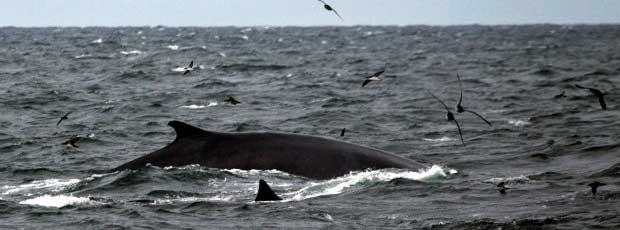 Fin whales have been called the “the greyhounds of the sea” because they are fast and sleek. grwoing to almost 90 feet, they are the second longest animal on the planet but only the the sixth heaviest. Though they are baleen whales, from a distance they can be mistaken for dolphins due to their scimitar shaped dorsal fins. The great fin whales have now returning to the Irish Sea off Wales and the Sea Trust is keeping an eye out for them. Sea Trust is the marine arm of the Wildlife Trust, South & West Wales.
Fin whales have been called the “the greyhounds of the sea” because they are fast and sleek. grwoing to almost 90 feet, they are the second longest animal on the planet but only the the sixth heaviest. Though they are baleen whales, from a distance they can be mistaken for dolphins due to their scimitar shaped dorsal fins. The great fin whales have now returning to the Irish Sea off Wales and the Sea Trust is keeping an eye out for them. Sea Trust is the marine arm of the Wildlife Trust, South & West Wales.
Giant fin whales making their annual trip to Welsh waters
[The fin whale] was heavily hunted during the 20th century, becoming an endangered species. Almost 750,000 fin whales were taken from the southern hemisphere alone between 1904 and 1979.
Cliff Benson, Fishguard- based Sea Trust’s co-ordinator said the annual arrival of fin whales in Pembrokeshire was a sign that the international moratorium on hunting fin whales has been successful so far.
He said: “It’s a sign of marine health that the whales are coming here. A ban on herring fishing has led to a revival of huge numbers of the fish.
“I think everyone connected with the Sea Trust in Wales, mainly volunteers, ordinary men and women who want to do something to help marine wildlife, should be very proud of themselves at the moment.”
The Sea Trust’s monitoring of the fin whales is also going to help the creatures survive deadly interference by military sonar.
Mr Benson explained: “The European Defence Agency’s Protection of Marine Mammals project, including the Ministries of Defence for Germany, Italy, the Netherlands, Norway, Sweden and the UK, have asked us to provide them with our records.
“The project aims to protect marine mammals against the impact of active sonar deployed by European navies. This could save the lives of many of the whales and dolphins that inhabit our waters.
“We have the most comprehensive records of cetacean sightings for West Wales and the Sea Trust works with the Atlantic Recording Coalition (ARC), made up of similar marine conservation groups from all over Europe, who will also be supplying their records.
“We are keen to work closely with the military to prevent incidents such as the one off Cornwall which killed more than 20 common dolphins which stranded on the coast after a naval exercise a couple of years ago.
Thanks to Irwin Bryan for passing the article along.
